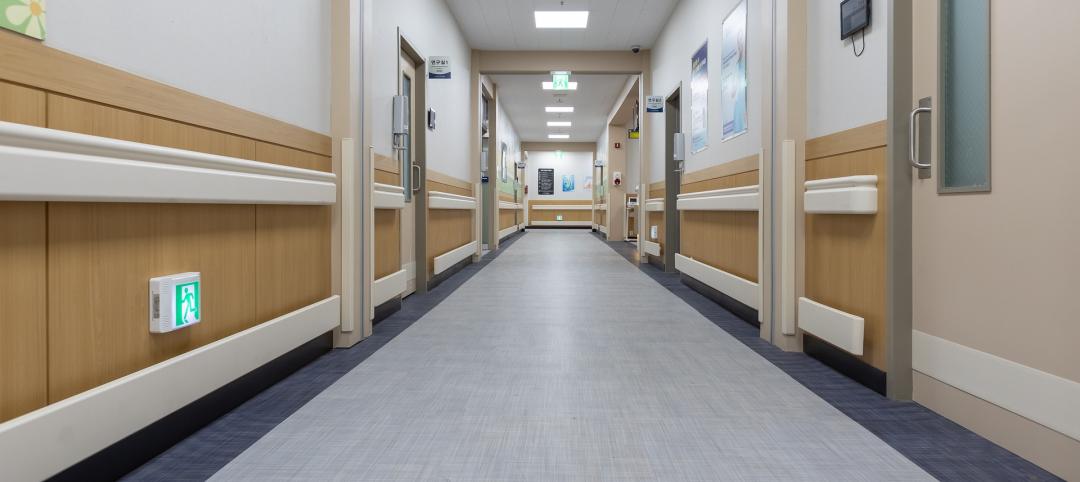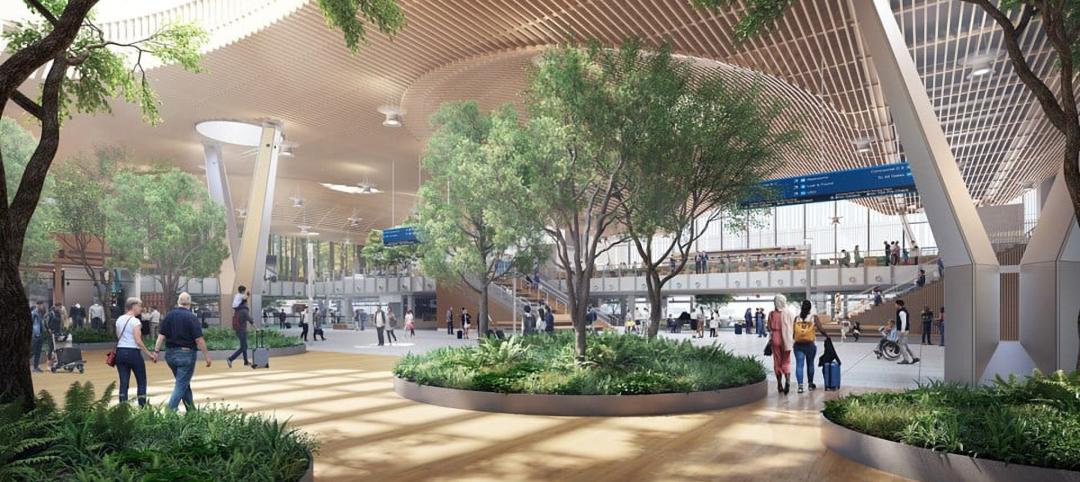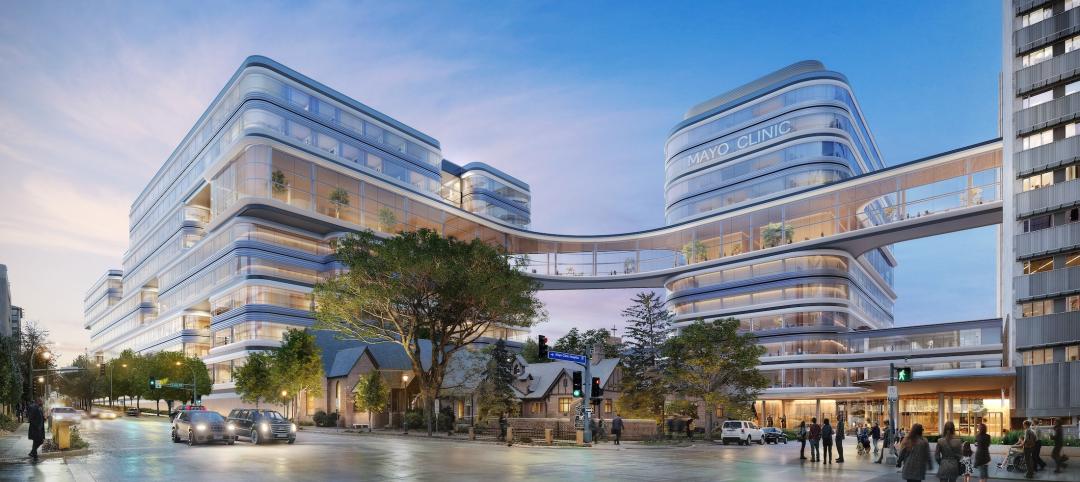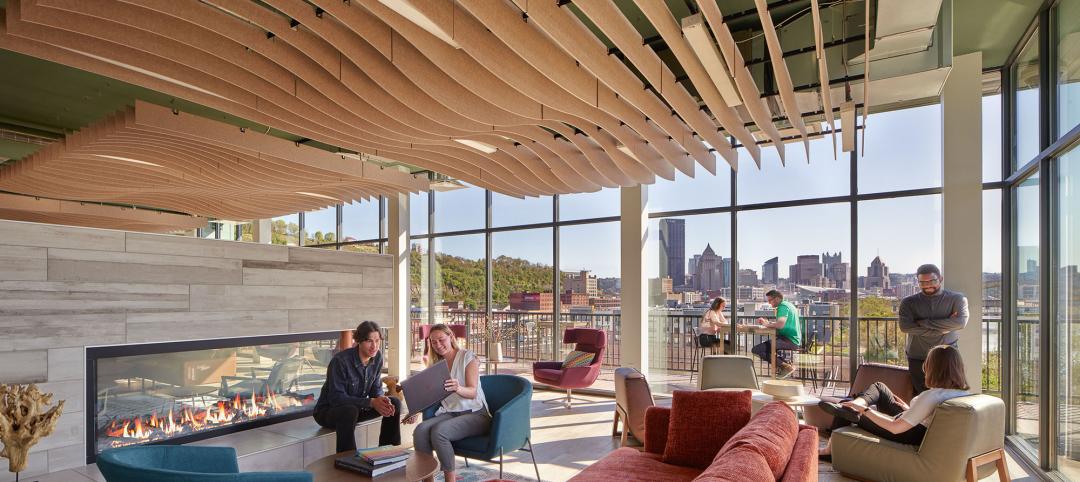 |
|
Built as an homage to the Washington Monument, Minneapolis’s funky Foshay Tower becomes the even funkier W Hotel. |
At one time the tallest building west of the Mississippi, the Foshay Tower has stood proudly on the Minneapolis skyline since 1929. Built by Wilbur Foshay as a tribute to the Washington Monument, the 30-story obelisk served as an office building—and cultural icon—for more than 70 years before the Ryan Companies and co-developer RWB Holdings partnered with Starwood Hotels & Resorts to convert the registered landmark into, of all things, a hip W Hotel.
Adaptive reuse projects are always tricky, but the building's distinctive obelisk shape complicated matters to the extent that when architects Elness Swenson Graham completed the design, there were 57 unique room configurations within the 230-room hotel. The tower loses half its floor area between the second floor and the 30th floor, dropping from 6,000 sf on the second floor to less than 3,000 sf at the top. The complex floor plates also threw MEP contractors Horwitz Inc. and Egan Companies a curve because there was no way to stack plumbing and mechanical systems. Their solution was to break the hotel into flooring groups and then make transitions between each floor set.
The Building Team also faced the high-stakes task of preserving and restoring the building's historic Art Deco lobby ceiling, marble walls, and terrazzo floors. These elements were integrated into the W's modern design aesthetic by interior design team Munge Leung Design Associates.
 |
|
The building’s tapered shape required interior designers to commission adjustable furniture that fits the hotel’s 57 different room configurations. |
On top of everything else, there was no wiggle room on the opening date, August 2008, because the Republican National Convention was being hosted in the twin city of St. Paul the following month and Starwood needed the guest rooms.
Using design-build delivery, Ryan Companies redeveloped the 268,000-sf Foshay Tower at a construction cost of $56 million. The project's final cost was $61 million after the Building Team assumed responsibility for the hotel's restaurant and retail components from the tenants.
Working in the Building Team's favor was the fact that the landmark building was structurally sound and in good shape for its age—that is, unless you ignore the fact that it was packed with asbestos. A tight timeline required asbestos remediation to begin while some office tenants were still in the building. This dictated a more complicated than usual containment system: partition systems, dedicated elevators, night work, and coordinated adjacencies. Tenants were provided generous move-out packages to expedite their exit.
Complications also arose around the building's old windows. Almost 750 units needed to be replaced, which disappointed the National Park Service, since the Foshay Tower is on the National Register of Historic Places. After considerable negotiations, the two sides agreed that replacement could proceed using custom, historically accurate, high-efficiency aluminum units.
The project greatly impressed BD+C's Reconstruction Awards judges, who appreciated the difficulties associated with adaptive reuse projects. “It is really challenging to convert an office building into a hotel,” says Lucien Lagrange, principal of Lucien Lagrange Architects, Chicago. “The Foshay project says something about adaptive reuse and the importance of saving a beautiful existing building.”

Related Stories
Healthcare Facilities | Jul 11, 2024
New download: BD+C's 2024 Healthcare Annual Report
Welcome to Building Design+Construction’s 2024 Healthcare Annual Report. This free 66-page special report is our first-ever “state of the state” update on the $65 billion healthcare construction sector.
Mass Timber | Jun 17, 2024
British Columbia hospital features mass timber community hall
The Cowichan District Hospital Replacement Project in Duncan, British Columbia, features an expansive community hall featuring mass timber construction. The hall, designed to promote social interaction and connection to give patients, families, and staff a warm and welcoming environment, connects a Diagnostic and Treatment (“D&T”) Block and Inpatient Tower.
Healthcare Facilities | Jun 13, 2024
Top 10 trends in the hospital facilities market
BD+C evaluated more than a dozen of the nation's most prominent hospital construction projects to identify trends that are driving hospital design and construction in the $67 billion healthcare sector. Here’s what we found.
Healthcare Facilities | May 28, 2024
Healthcare design: How to improve the parking experience for patients and families
Parking is likely a patient’s—and their families—first and last touch with a healthcare facility. As such, the arrival and departure parking experience can have a profound impact on their experience with the healthcare facility, writes Beth Bryan, PE, PTOE, PTP, STP2, Principal, Project Manager, Walter P Moore.
Hospital Design Trends | May 23, 2024
The unique design needs of Critical Access Hospitals
BWBR healthcare principals Brad Krump, AIA, and Scott Kirchner, AIA, discuss their industry experience and passion for supporting the role that critical access hospitals play in their communities.
Healthcare Facilities | May 6, 2024
Hospital construction costs for 2024
Data from Gordian breaks down the average cost per square foot for a three-story hospital across 10 U.S. cities.
Biophilic Design | May 6, 2024
The benefits of biophilic design in the built environment
Biophilic design in the built environment supports the health and wellbeing of individuals, as they spend most of their time indoors.
Architects | May 2, 2024
Emerging considerations in inclusive design
Design elements that consider a diverse population of users make lives better. When it comes to wayfinding, some factors will remain consistent—including accessibility and legibility.
Healthcare Facilities | Apr 3, 2024
Foster + Partners, CannonDesign unveil design for Mayo Clinic campus expansion
A redesign of the Mayo Clinic’s downtown campus in Rochester, Minn., centers around two new clinical high-rise buildings. The two nine-story structures will reach a height of 221 feet, with the potential to expand to 420 feet.
Architects | Apr 2, 2024
AE Works announces strategic acquisition of WTW Architects
AE Works, an award-winning building design and consulting firm is excited to announce that WTW Architects, a national leader in higher education design, has joined the firm.
















